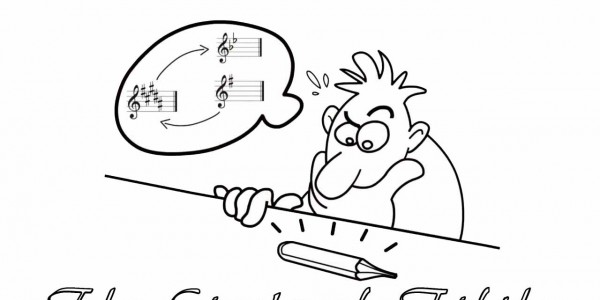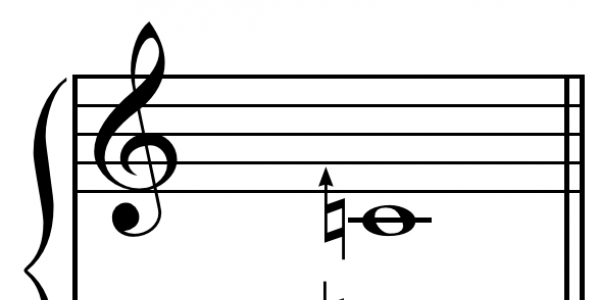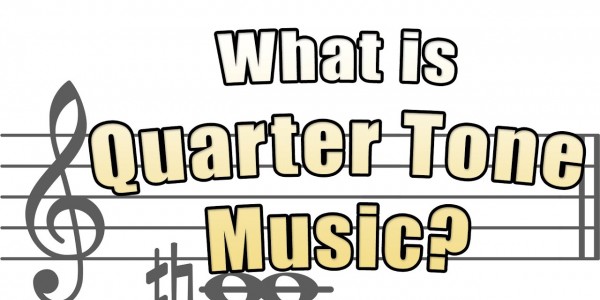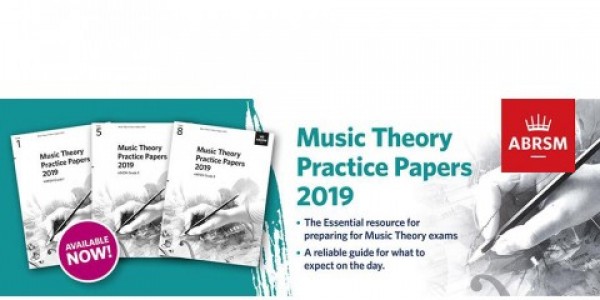What is Harmony? Explained in 5 different levels.
theory
In this video I explain Circle of Fifths and demonstrate some of its many uses in music composition.
The Circle of Fifths is a visual representation of the relationships between the 12 tones of the chromatic scale. It was invented by the Greek philosopher Pythagoras and is so called as it takes the form of a circle around which each of the 12 tones are laid out. As you move around the circle in a clockwise direction, the next tone you encounter will be a 5th above the tone before it... See More
In this video I explain Circle of Fifths and demonstrate some of its many uses in music composition.
The Circle of Fifths is a visual representation of the relationships between the 12 tones of the chromatic scale. It was invented by the Greek philosopher Pythagoras and is so called as it takes the form of a circle around which each of the 12 tones are laid out. As you move around the circle in a clockwise direction, the next tone you encounter will be a 5th above the tone before it.
The Circle of Fifths lies at the very foundation of western music theory and is therefore extremely useful as you can refer to it to help you find out things like, what key you are in. If you are in a major key it helps you find the relative minor key and visa versa. It tells you which chords are available in which key. It can even help you to transpose your music into a different key and move between keys within a song.
This amazing lecture series (The unanswered Question), is actually an interdisciplinary overview about the evolution of Western European classical music from Bach through the 20th century crisis and beyond a bit.
Mr. Bernstein uses linguistics namely Chomskian Linguistics to provide a framework to illustrate how music and all the arts evolved toward greater and greater levels of ambiguity / expressivity over history until the 20th century crisis.
He manages this impressive... See More
This amazing lecture series (The unanswered Question), is actually an interdisciplinary overview about the evolution of Western European classical music from Bach through the 20th century crisis and beyond a bit.
Mr. Bernstein uses linguistics namely Chomskian Linguistics to provide a framework to illustrate how music and all the arts evolved toward greater and greater levels of ambiguity / expressivity over history until the 20th century crisis.
He manages this impressive feat of popular education, by dividing music into; Phonology (the study of sound); Syntax (the study of structure) and; Semantics (the study of meaning).
#LeonardBernstein #lecture #bernstein #chomskian #phonology #syntax #semantic #history #evolution #theory #masterclass
Bring music theory to life with fun and engaging challenges at Grades 1–5.
ABRSM Theory Works contains over 6,000 specially-written questions designed to test and challenge your music theory knowledge.
Start by learning the basics then test yourself and see if you can get a perfect score. Every time you complete a round, you’ll unlock the next level. Watch your music theory knowledge build up in these fun challenges and become a music theory expert!
... See More
Bring music theory to life with fun and engaging challenges at Grades 1–5.
ABRSM Theory Works contains over 6,000 specially-written questions designed to test and challenge your music theory knowledge.
Start by learning the basics then test yourself and see if you can get a perfect score. Every time you complete a round, you’ll unlock the next level. Watch your music theory knowledge build up in these fun challenges and become a music theory expert!
On the basis of official and local advice, we have decided to suspend all Practical music exams outside the UK and Ireland from now until 1 July 2020, and our Representative will contact applicants with further guidance. We will update specific territories in due course in relation to exams after that date. We are sorry for any inconvenience and thank you for your loyal support during this challenging time.
Unfortunately due to recent measures announced by the UK Government, we have... See More
On the basis of official and local advice, we have decided to suspend all Practical music exams outside the UK and Ireland from now until 1 July 2020, and our Representative will contact applicants with further guidance. We will update specific territories in due course in relation to exams after that date. We are sorry for any inconvenience and thank you for your loyal support during this challenging time.
Unfortunately due to recent measures announced by the UK Government, we have taken the decision to cancel the remaining practical exams in this current session in Singapore from Friday 20 March to Friday 27 March. All future exams until 1 July 2020 have been postponed, including the theory exam on 28 March. Our representative will contact applicants with further guidance. We are very sorry that this has impacted your candidates’ exams, and thank you for your loyal support during this challenging time. Please keep checking the website and social media channels for further updates.
Notice regarding Music Theory exams on 28 March
Unfortunately the Music Theory exam on the 28 March 2020 will be postponed due to continuing concerns surrounding the COVID-19 outbreak.
ABRSM are sorry this is the case but candidates’ and exam staffs’ safety and wellbeing must remain our top priority.
#abrsm #exam #theory #WuhanVirus #covid19 #coronavirus #wuhan #SocialDistancing #pandemic #teacher #parent #application #register #practical
Under local advice ABRSM has decided that the Music Theory exam on 28 March 2020 in Singapore should be cancelled due to concerns surrounding COVID-19. We are very sorry this is the case and will of course be in touch with all applicants regarding the possible rescheduling of the exam at the nearest opportunity.
Practical ABRSM exams in Singapore are taking place as planned between 24 February and 27 March. We are continuing to follow official advisories and will inform you should... See More
Under local advice ABRSM has decided that the Music Theory exam on 28 March 2020 in Singapore should be cancelled due to concerns surrounding COVID-19. We are very sorry this is the case and will of course be in touch with all applicants regarding the possible rescheduling of the exam at the nearest opportunity.
Practical ABRSM exams in Singapore are taking place as planned between 24 February and 27 March. We are continuing to follow official advisories and will inform you should this advice change.
#abrsm #exam #theory #WuhanVirus #covid19 #teacher #parent #application #register #practical
Syntonic Comma is a small comma type interval between two musical notes, equal to the frequency ratio 81:80 (= 1.0125) (around 21.51 cents).
Two notes that differ by this interval would sound different from each other even to untrained ears, but would be close enough that they would be more likely interpreted as out-of-tune versions of the same note than as different notes.
The comma is also referred to as a Didymean comma because it is the amount by which Didymus corrected the... See More
Syntonic Comma is a small comma type interval between two musical notes, equal to the frequency ratio 81:80 (= 1.0125) (around 21.51 cents).
Two notes that differ by this interval would sound different from each other even to untrained ears, but would be close enough that they would be more likely interpreted as out-of-tune versions of the same note than as different notes.
The comma is also referred to as a Didymean comma because it is the amount by which Didymus corrected the Pythagorean major third (81:64, around 407.82 cents) to a just major third (5:4, around 386.31 cents).
Someone commented: "My music teacher in school taught me, Eastern music has quarter tones and third tones. When I recently looked up closer what just intonation of keys means, I found the syntonic comma. The syntonic comma is about a ninth tone. There is half, quarter, third and ninth, but no eighth note I'm aware of."
#QuarterTone #tuning... See More
Someone commented: "My music teacher in school taught me, Eastern music has quarter tones and third tones. When I recently looked up closer what just intonation of keys means, I found the syntonic comma. The syntonic comma is about a ninth tone. There is half, quarter, third and ninth, but no eighth note I'm aware of."
#QuarterTone #tuning #teacher #learning #theory #SyntonicComma
A quarter tone is a pitch halfway between the usual notes of a chromatic scale or an interval about half as wide (aurally, or logarithmically) as a semitone, which itself is half a whole tone.
Quarter tones divide the octave by 50 cents each, and have 24 different pitches.
#QuarterTone #tuning... See More
A quarter tone is a pitch halfway between the usual notes of a chromatic scale or an interval about half as wide (aurally, or logarithmically) as a semitone, which itself is half a whole tone.
Quarter tones divide the octave by 50 cents each, and have 24 different pitches.
Music Theory Practice Papers and Model Answers 2019
ABRSM’s official Practice Papers are essential resources for candidates preparing for our Music Theory exams. They provide authentic practice materials and a reliable guide to what to expect in the exam.
The new papers are selected from the 2019 Music Theory exam papers. Each graded collection contains four papers from the 2019 exams; there is also a corresponding set of Model Answers for each grade.
... See More
Music Theory Practice Papers and Model Answers 2019
ABRSM’s official Practice Papers are essential resources for candidates preparing for our Music Theory exams. They provide authentic practice materials and a reliable guide to what to expect in the exam.
The new papers are selected from the 2019 Music Theory exam papers. Each graded collection contains four papers from the 2019 exams; there is also a corresponding set of Model Answers for each grade.
#abrsm #exam #theory #revision #solutions #answers #teacher #parent #learning
How to add a Post
- Select a Discussion Group on the left.
- Type in the box at the top.
- Post it!
Discussion Rules and Guidelines
Discussion Groups are where people interact and discuss about various topics. Following these rules and guidelines help to build a better place for more productive conversations.









